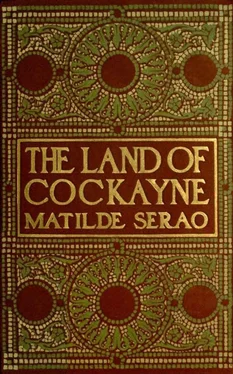Matilde Serao - The Land of Cockayne
Здесь есть возможность читать онлайн «Matilde Serao - The Land of Cockayne» — ознакомительный отрывок электронной книги совершенно бесплатно, а после прочтения отрывка купить полную версию. В некоторых случаях можно слушать аудио, скачать через торрент в формате fb2 и присутствует краткое содержание. Жанр: unrecognised, на английском языке. Описание произведения, (предисловие) а так же отзывы посетителей доступны на портале библиотеки ЛибКат.
- Название:The Land of Cockayne
- Автор:
- Жанр:
- Год:неизвестен
- ISBN:нет данных
- Рейтинг книги:3 / 5. Голосов: 1
-
Избранное:Добавить в избранное
- Отзывы:
-
Ваша оценка:
- 60
- 1
- 2
- 3
- 4
- 5
The Land of Cockayne: краткое содержание, описание и аннотация
Предлагаем к чтению аннотацию, описание, краткое содержание или предисловие (зависит от того, что написал сам автор книги «The Land of Cockayne»). Если вы не нашли необходимую информацию о книге — напишите в комментариях, мы постараемся отыскать её.
The Land of Cockayne — читать онлайн ознакомительный отрывок
Ниже представлен текст книги, разбитый по страницам. Система сохранения места последней прочитанной страницы, позволяет с удобством читать онлайн бесплатно книгу «The Land of Cockayne», без необходимости каждый раз заново искать на чём Вы остановились. Поставьте закладку, и сможете в любой момент перейти на страницу, на которой закончили чтение.
Интервал:
Закладка:
He stopped speaking, as if gazing through the room's darkness on fortune's splendid mirage that excited fancy brought before his eyes. His daughter got calm and thoughtful again as she listened to him. Her father's voice in the usual rhapsodies of his overheated soul sounded in her heart with anguished echoes, like a slow torment.
It is true she did not believe in the visions, but her father's impetuous, angry, tender phrases frightened her every evening. She could not get accustomed to these bursts of passion that made her peace-loving soul start and shiver.
'Signor Marzano,' Giovanni announced.
A little bent old man came in with a rough, pepper-and-salt moustache, his eyes piercing and at the same time soft. He was very plainly dressed. On passing near Bianca Maria he greeted her gently, and silently asked permission to keep his hat on. He held his Indian cane, too. Falling into step with the Marquis, the two walked up and down together, speaking in a very low voice. When they passed near the light, one saw the advocate's eyes sparkling with satisfaction, and his rather military moustache moving as if he was making mental calculations. Sometimes Bianca Maria, who busied herself more and more in her work so as not to hear, caught involuntarily some cabalistic jargon of her father's or Marzano's.
'The cadenza of seven must win.'
'We might also get the two of ritorno.'
'Playing for situazione is too risky.'
'A bigliettone is needed.'
They went on speaking, quite absorbed, their eyes flashing, lost in these fancies that falsely take the precision and fascination of mathematics, when Giovanni again came in, to announce, 'Dr. Trifari.'
A man about thirty came in, strong-limbed and stout, with a big head, too short a neck, a red curly beard that made his face even redder than it was, swollen lips, and blue, staring, suspicious eyes that did not inspire confidence. He was roughly dressed: a tight collar rasped his neck, a big sham diamond pin shone in his black silk tie, and he still had a provincial air, in spite of his University degree. He hardly greeted Bianca Maria, put his hat on a side-table, and went to the Marquis di Formosa's other side. All three marched up and down more quietly. Sometimes Dr. Trifari said a word, or gesticulated violently, speaking in a whisper all the same, his squinting glance questioning his audience and the shades around as if he feared to be betrayed.
The learned Marquis di Formosa kept up his vivacious look like a headstrong old man; Marzano persisted in laughing good-naturedly with his cunning, gentle eyes; whilst Dr. Trifari went about cautiously, as if he always feared being cheated. When the two old men raised their voices a little, he quickly signed to them repressively, pointing at the doors and windows; he went so far as to point to Bianca Maria. The Marquis waved his hand tolerantly, as if to say she was an innocent creature, when again Giovanni came in, to announce, 'Professor Colaneri.'
At once on seeing him, one guessed he was an unfrocked priest. A thick black beard had grown on his shaven cheeks; but the hair cut short on the forehead, and growing thinly over the tonsure, kept the ecclesiastical cut. The shape of his hand, where the crooked thumb seemed joined to the first finger; the way he settled his spectacles on his nose; his trick of putting two fingers in his collar to widen it, as if it was the tight priest's collar; his way of making his glance fall from above—his features and movements altogether were so clerical, one quickly understood his character.
Formosa received him rather coldly, as usual; the apostate gave his religious mind a repulsive shudder. Colaneri, too, spoke very cautiously; four could not walk about without speaking aloud, so they stood in a dark window recess. It was there Ninetto Costa came to join them, a dark, handsome fellow, showing the whitest of teeth in a continuous smile; he was one of the luckiest stockbrokers on the Naples Exchange.
Last of all, Giovanni announced one man in a whisper, negligently, 'Don Crescenzio,' a type between a clerk and an agent, who slipped into the room rather timidly; still, he was treated as an equal. The discussion between the six men grew warm in the window recess, but they kept their voices low.
Bianca Maria went on working mechanically. She felt dreadfully embarrassed; she dared not go away without asking her father's permission, and she felt she was out of place in the room. This mysterious talk, in an incomprehensible, mad jargon, all so excited and eager, rolling their eyes about so sternly; a growing madness in their glances; their faces pale and then flushed from making such violent gestures, disturbed her at first, and ended by frightening her. Her father especially seemed lost in the midst of all these madmen, some of them coldly, others wildly, interested, and all extremely obstinate. She looked at him sometimes in despair, as if she saw him drowning, and could not take a step or give a cry to help him. Just then the six men came slowly filing out of the window recess, and sat down round another card-table, where there was no light. They drew in their chairs to get closer together, put their elbows on the table, leaning their heads on their hands, and all began talking at once in the half-light, whispering in each other's faces, breathing out the words, looking each other straight in the eyes, as if they were using magic and charms.
Bianca Maria could stand it no longer. Making as little noise as possible, she wrapped up her lace pillow in a strip of black linen, got up without moving her chair, so as not to make a sound, and went out of the big room quickly, as if she feared to be called back, with a frightened feeling as if someone were following her. She was slightly reassured only as she got into her own room. It was plain and clean, rather cold-looking, a good, pious girl's room, full of holy images, rosaries, and Easter candles. Margherita, the servant, came to join her, having heard her step. With humble affection she asked if she was going to bed.
'No, no; I am not sleepy. I will wait. I have not said good-night to my father.'
'The Marquis will sit up till all hours,' the maid muttered. 'You will get tired waiting here all alone.'
'I will read. I wish to wait.'
The old servant obediently disappeared.
Bianca Maria took from a little shelf a religious novel of Pauline Craven's, 'Le Mot de l'Énigme,' a pious, consolatory book. But her mind would not be soothed that evening by the French author's gentle words. Sometimes the girl listened intently to find out if her father's friends were going away or if others were coming. There was nothing—not a sound. The great weekly mysterious conspiracy was going on, breathed out from face to face as if it was a frightful piece of witchcraft. This impression grew so on Bianca Maria's mind, that now even the silence frightened her. She tried again two or three times to read the charming book, but her eyes rested on the printed lines without seeing them. The sense of the words she forced herself to read escaped her. Her whole mind was taken up listening to the noises in the drawing-room. Silence still, as if not a living soul was there. She shut the book and called the servant, not feeling able to bear that solitude full of ghosts.
Margherita hastened in, and silently awaited her young mistress's orders.
'Let us say the Rosary,' she whispered.
Sometimes, when the hours seemed longest to the lonely scion of the Cavalcanti, when sleeplessness kept her eyes open, when her fancies got too lugubrious, she loved to pray aloud with her maid to cheat time, hours of watching, nervousness. She dreaded speaking to servants—her natural pride made her avoid it; but praying together seemed to her only a simple act of Christian humility.
'Let us say the Rosary,' she repeated, seating herself by her white bed.
Читать дальшеИнтервал:
Закладка:
Похожие книги на «The Land of Cockayne»
Представляем Вашему вниманию похожие книги на «The Land of Cockayne» списком для выбора. Мы отобрали схожую по названию и смыслу литературу в надежде предоставить читателям больше вариантов отыскать новые, интересные, ещё непрочитанные произведения.
Обсуждение, отзывы о книге «The Land of Cockayne» и просто собственные мнения читателей. Оставьте ваши комментарии, напишите, что Вы думаете о произведении, его смысле или главных героях. Укажите что конкретно понравилось, а что нет, и почему Вы так считаете.












